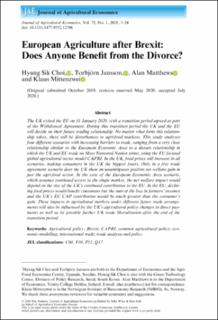| dc.contributor.author | Choi, Hyung Sik | |
| dc.contributor.author | Jansson, Torbjörn | |
| dc.contributor.author | Matthews, Alan | |
| dc.contributor.author | Mittenzwei, Klaus | |
| dc.date.accessioned | 2021-01-26T15:17:06Z | |
| dc.date.available | 2021-01-26T15:17:06Z | |
| dc.date.created | 2020-10-22T09:15:40Z | |
| dc.date.issued | 2020-08-30 | |
| dc.identifier.citation | Journal of Agricultural Economics. 2020, 72 (1), 3-24. | en_US |
| dc.identifier.issn | 0021-857X | |
| dc.identifier.uri | https://hdl.handle.net/11250/2724836 | |
| dc.description.abstract | The UK exited the EU on 31 January 2020, with a transition period agreed as part of the Withdrawal Agreement. During this transition period the UK and the EU will decide on their future trading relationship. No matter what form this relationship takes, there will be disturbances to agri‐food markets. This study analyses four different scenarios with increasing barriers to trade, ranging from a very close relationship similar to the European Economic Area to a distant relationship in which the UK and EU trade on Most Favoured Nation terms, using the EU focused global agricultural sector model CAPRI. In the UK, food prices will increase in all scenarios, making consumers in the UK the biggest losers. Only in a free trade agreement scenario does the UK show an unambiguous positive net welfare gain in just the agri‐food sector. In the case of the European Economic Area scenario, which assumes continued access to the single market, the net welfare impact would depend on the size of the UK’s continued contribution to the EU. In the EU, declining food prices would benefit consumers but the sum of the loss in farmers’ incomes and the UK’s EU CAP contribution would be much greater than the consumer’s gain. These impacts in agricultural markets under different future trade arrangements will also be influenced by the UK’s agricultural policy changes in direct payments as well as by possible further UK trade liberalisation after the end of the transition period. | en_US |
| dc.language.iso | eng | en_US |
| dc.publisher | John Wiley & Sons Ltd. | en_US |
| dc.rights | Navngivelse 4.0 Internasjonal | * |
| dc.rights.uri | http://creativecommons.org/licenses/by/4.0/deed.no | * |
| dc.title | European Agriculture after Brexit: Does Anyone Benefit from the Divorce? | en_US |
| dc.type | Peer reviewed | en_US |
| dc.type | Journal article | en_US |
| dc.description.version | publishedVersion | en_US |
| dc.rights.holder | © 2020 The Authors | en_US |
| dc.source.pagenumber | 3-24 | en_US |
| dc.source.volume | 72 | en_US |
| dc.source.journal | Journal of Agricultural Economics | en_US |
| dc.source.issue | 1 | en_US |
| dc.identifier.doi | 10.1111/1477-9552.12396 | |
| dc.identifier.cristin | 1841368 | |
| cristin.ispublished | true | |
| cristin.fulltext | original | |
| cristin.qualitycode | 1 | |

